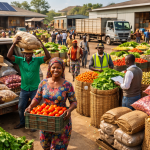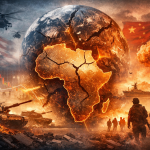For Africans who live in authoritarian regimes while believing and fighting for human rights, democracy, and justice, the world has traditionally been a lonely place. In January 2025, it is not only lonely but truly perplexing.
While our history with the West has made for a conflictual relationship at best, with its heavy baggage of colonialism, neocolonialism, support for dictators, racism, and all the rest, Western democracies and their civil liberties have remained for decades a key benchmark for us as we strive to build still-elusive African democracies. Western activists and citizens have often stood as allies, sometimes even challenging their own governments alongside us. For decades, the script was clear: fundamental rights, free speech, strong institutions, facts, science, and the rule of law = good; strongmen/women, discrimination, rights violations, lies, and tribalism = bad.
What on earth is happening now?
We live in authoritarian regimes and know intimately the multiple and convoluted facets of destruction these regimes wreak on the human body and soul, as well as on the social, economic and political fabric of every community. It is quite horrific to watch citizens in Western countries, one after another, stroll voluntarily into the strangling embrace of the far right and the authoritarianism it augurs for their nations. Have they no recollection of their very own histories?
We fully understand the real and complex problems driving the anxiety of Western citizens. Extreme, unregulated capitalism and globalization have driven poor decisions about workers’ conditions, social services and climate, creating unprecedented inequality. Political processes are overly influenced by lobbies and oligarchs, while the influence of citizens and subsequently their trust in government has eroded. Due to birth rates and migration, Western nations are “browning”. Some citizens are deeply uncomfortable with this reality. The rise of the BRICS is definitively ending Western global hegemony and adding layers to the anxiety and uncertainty. The problems are real.
As in every crisis, this is a moment of immense opportunity. Now is the time to develop migration solutions that balance economic needs, demographic realities, and social integration. Solutions that balance Africa’s needs for work and upskilling with Europe’s need for workers and talent. These solutions require deep analysis and innovative thinking. They require truly functional governments. Unfortunately, a phenomenon we know all too well in Africa is at play in Germany and other Western countries. Political moderates skirt the issues and avoid difficult, long-term solutions as they try to win elections. Meanwhile, populists develop and propagate a tribalistic agenda that serves a slim minority. It works.
The United States has fallen, France and the United Kingdom are holding on by their fingernails but have fallen far enough to be in what appear as intractable political messes. As Germany goes to the polls on February 23rd, the question on our minds is, will Germany be able to hold the line?
Holding the line here requires multiple steps.

First, the left, center and right must win enough to block the extreme right and keep it out of government. From an African perspective a German government that is at a minimum not overtly racist and capable of rationally tackling the complexity of the polycrisis the world is facing, would be a good thing.
Second, holding the line means greatly improving the functionality of German coalition governance. For Africa, a new German government able to tackle systemic challenges will mean opportunities for innovative, game-changing partnerships. A strong German economy will mean possibilities for Africa’s liquified natural gas, “transition fossil fuel”, and the opportunity to revolutionize contracts for African critical minerals. A German government ready to tackle complex problems will mean finding immigration solutions such as work-partnerships that benefit both countries, reinforcing the type of partnership Germany began with Kenya in 2024 to make it truly win-win. In a world of capitalism gone awry, Africa needs the German model of economic growth with strong social services to succeed.
Third, holding the line means seizing the current vacuum to lead globally on a human rights, equality and justice agenda. As African change-leaders, we bear the full responsibility of building our own democracies. No one can do that for us. However, we need allies on the global scene with shared values, shared principles and the will and capacity to build together.
Germany, despite its recent credibility issues regarding human rights (notably on Palestine), remains uniquely positioned to lead on this essential pillar of multilateralism. Its size, its power, its ability to respond to social needs while growing its economy, its strong position in international institutions and perhaps most importantly its ability to keep its billionaires in check (so far), all open up this unique possibility at this global historical carrefour.
As Africans striving to build homegrown democracies, we hope Germans heading to the polls will produce a government that not only addresses Germany’s challenges but one that can engage in novel and genuine partnership with Africa. Let this election remind us all that democracy, rights, and justice are universal struggles, which many including Germany have won before, and can win again.
On February 24th, as we in Africa continue our uphill battle for human rights, justice and democracy, we hope to feel a little less lonely.
Kah Walla
African and Global Citizen












